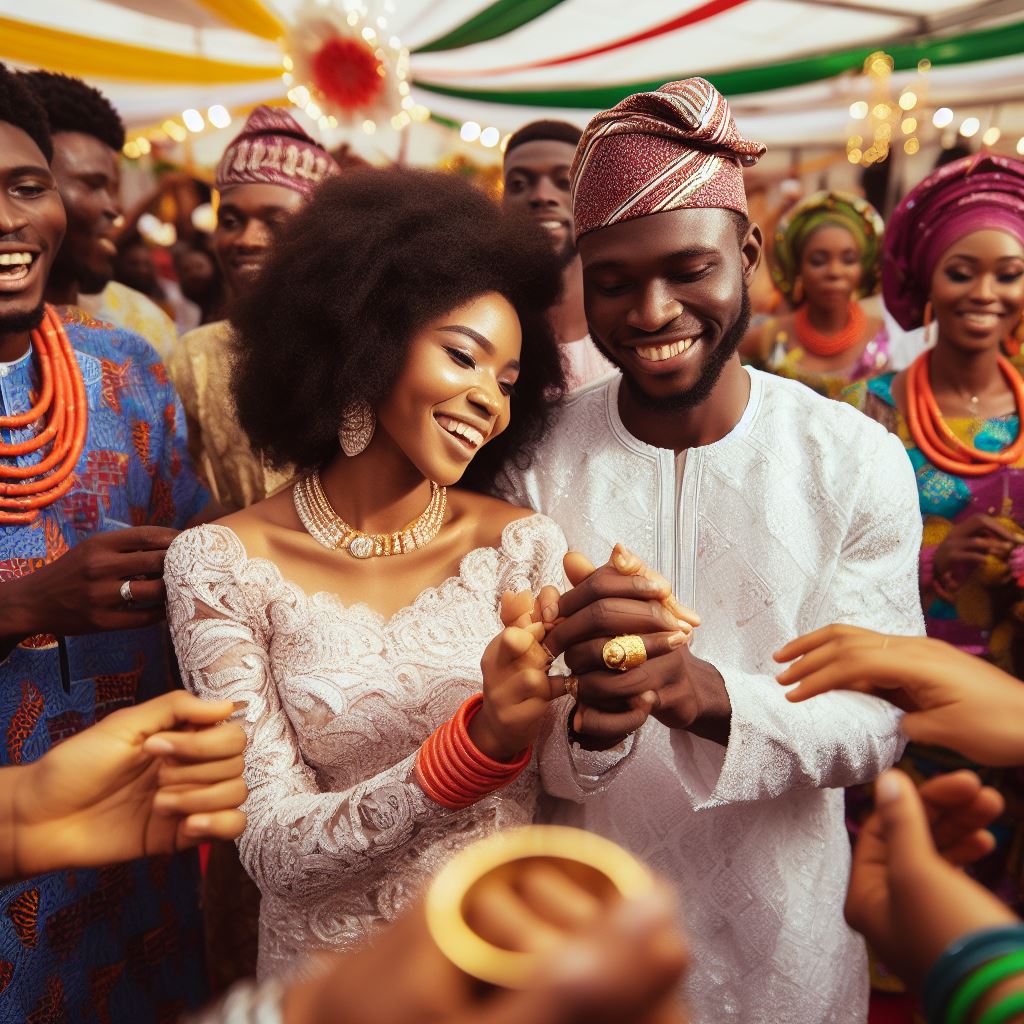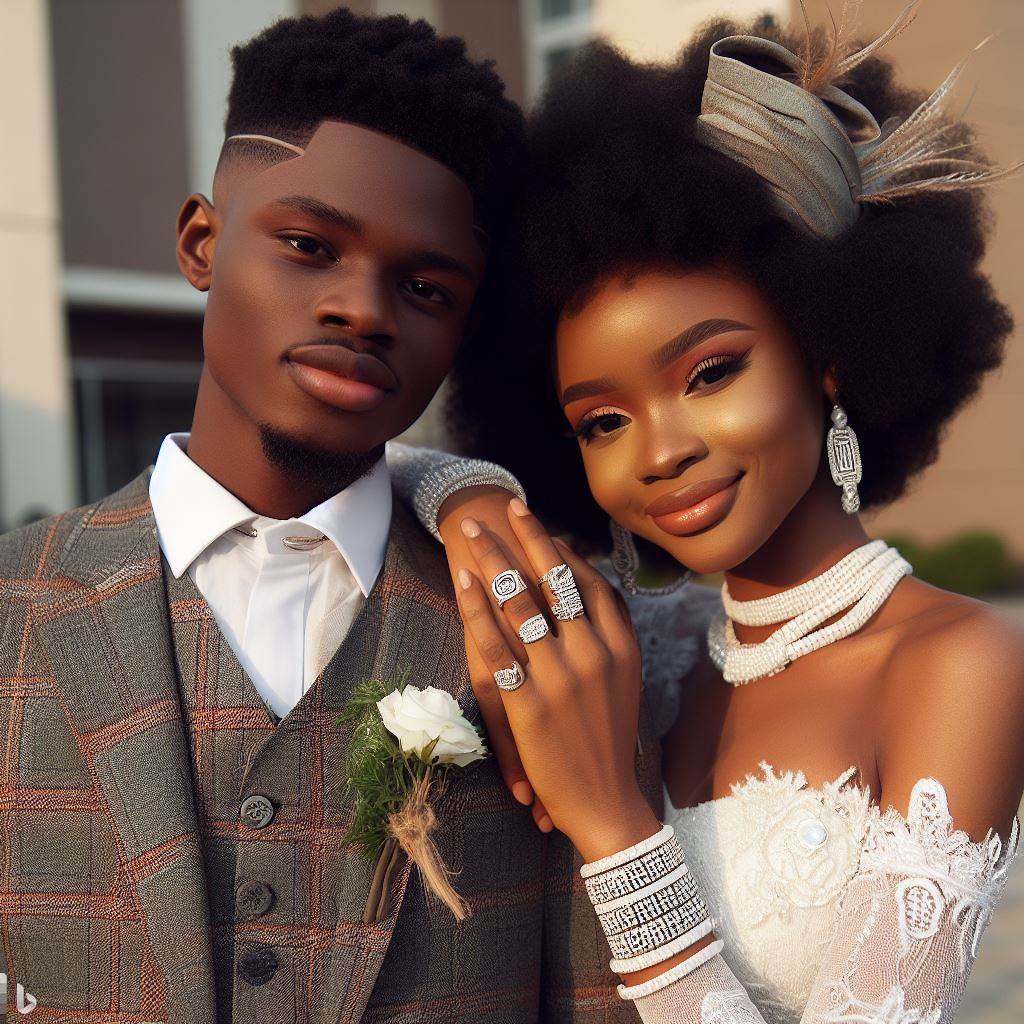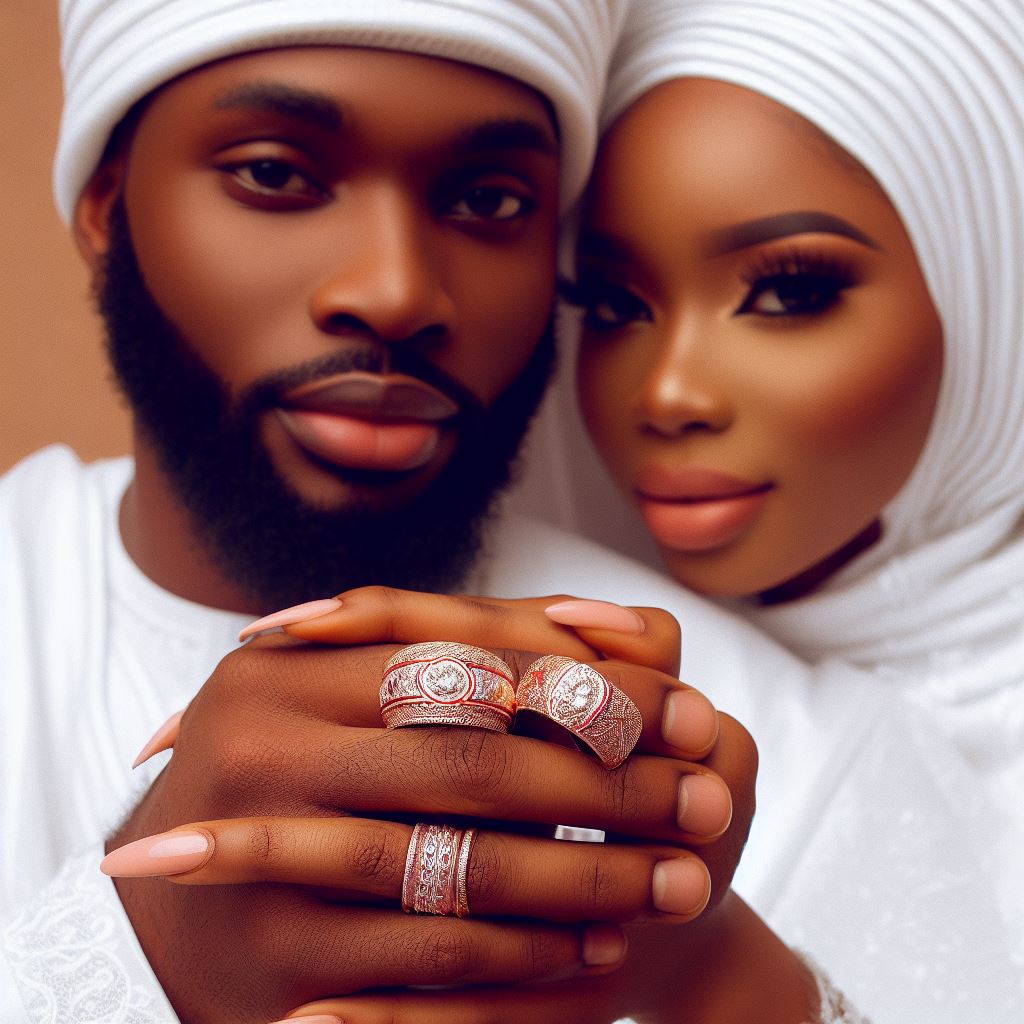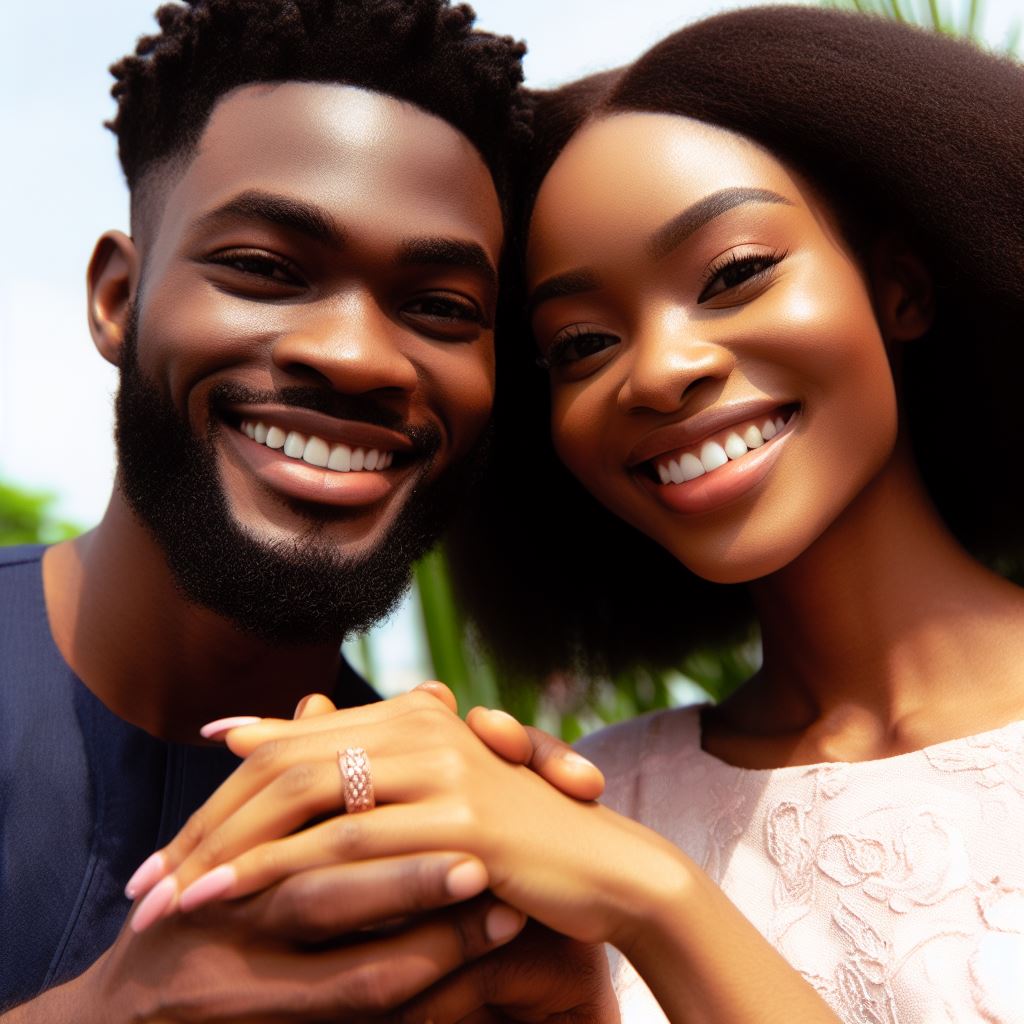Introduction
Yoruba Wedding Customs are rich in tradition and significance, reflecting the culture’s deep-rooted values.
One integral aspect of these customs is the use of marriage rings.
In Yoruba culture, marriage rings hold a special place, symbolizing various essential elements of the union.
This blog section explores the role and significance of marriage rings in Yoruba wedding customs.
We’ll delve into the cultural importance, symbolism, and rituals associated with these rings, shedding light on the profound meaning they carry in the context of Yoruba marriages.
In Yoruba culture, marriage is a sacred bond that signifies unity and love between two individuals.
It’s not just a union of two souls but also a merging of families, and the exchange of marriage rings plays a pivotal role in this symbolic act.
These rings serve as powerful tokens of commitment, fidelity, and a lifetime of love, encapsulating the essence of Yoruba matrimony.
As we embark on this journey through Yoruba wedding customs, we’ll unravel the layers of tradition and symbolism encapsulated in these rings, gaining a deeper understanding of the profound cultural significance they hold
Traditional Significance of Marriage Rings
A. Historical use of marriage rings in Yoruba weddings
- Exchange of rings has been a Yoruba wedding tradition for centuries.
- It has deep roots in Yoruba culture and symbolizes a lifelong commitment.
- The tradition of exchanging rings dates back to ancient times.
B. Symbolism and meaning behind the Yoruba marriage ring
- The marriage ring represents unity, love, and fidelity.
- It is a visible symbol of the marital bond and commitment.
- The circular shape of the ring signifies eternity and endless love.
C. Role of marriage rings in Yoruba traditional beliefs and rituals
- Yoruba weddings are accompanied by various rituals and ceremonies.
- The exchange of rings is a significant part of these rituals.
- The rings are believed to have spiritual powers that protect the couple and promote harmony.
In short, marriage rings hold a deep traditional significance in Yoruba weddings.
They have been used for centuries and represent unity, love, and fidelity.
The rings play a vital role in Yoruba traditional beliefs and rituals, symbolizing the joining of two families and providing spiritual protection.
The exchange of rings is a timeless tradition that reflects the everlasting nature of love and commitment in Yoruba culture.
Read: Marriage Forms in Nigeria: A Comprehensive Guide for Couples
Traditional Yoruba Wedding Ceremony
A. Overview of the different stages of a Yoruba wedding
Yoruba weddings are vibrant and rich in cultural traditions.
They consist of several stages, each with its own significance and rituals.
B. Specific role of the marriage ring in each stage
In this section, we will explore the different stages of a Yoruba wedding and the specific role of marriage rings in each stage.
1. Introduction and engagement
The first stage of a Yoruba wedding is the introduction and engagement ceremony.
This is when the families of the couple formally meet and exchange gifts.
The marriage ring plays a crucial role in this stage as it symbolizes the couple’s commitment and intention to marry.
The bride usually receives a gold engagement ring, which signifies her acceptance of the proposal.
This ring serves as a visible representation of her engagement and is worn on the left ring finger.
The groom, on the other hand, does not wear a ring during this stage.
2. Traditional engagement ceremony
The traditional engagement ceremony, also known as the “Igba-nkwu,” is a significant event in Yoruba weddings.
During this ceremony, the bride and groom exchange marriage rings and pledge their love and commitment to each other.
Both the bride and groom wear wedding rings during the traditional engagement ceremony.
The rings are usually made of gold and adorned with intricate designs.
The exchange of rings symbolizes the couple’s unity and their readiness to embark on the journey of marriage.
3. Nikkai (Islamic ceremony) or church wedding
Depending on the religious background of the couple, the Yoruba wedding may include a Nikkai (Islamic ceremony) or a church wedding.
During these religious ceremonies, the marriage rings hold spiritual significance.
In a Nikkai ceremony, the groom presents the bride with a wedding ring, which she willingly accepts.
This ring represents the groom’s commitment to meeting his responsibilities as a husband in accordance with Islamic principles.
In a church wedding, the couple exchanges marriage rings as a symbol of their commitment to God and their vow to love, cherish, and honor each other.
The rings serve as a physical reminder of their union in the presence of God and the congregation.
4. Traditional marriage ceremony (Igba-nkwu)
The final stage of a Yoruba wedding is the traditional marriage ceremony, known as Igba-nkwu.
This is a grand celebration where families and friends come together to witness the union of the couple.
During the Igba-nkwu ceremony, the bride and groom exchange marriage rings once again as a reaffirmation of their commitment to each other.
The rings serve as a symbol of their enduring love and their pledge to build a happy and prosperous future together.
In essence, marriage rings hold significant importance in the various stages of a Yoruba wedding.
From the introduction and engagement ceremony to the traditional marriage ceremony, the exchange of rings symbolizes love, commitment, and unity between the couple.
These rings serve as tangible reminders of the couple’s journey towards a lifelong partnership.
Read: Public vs. Private Proposals: What Works Best in Nigeria?

Symbolic Elements of the Marriage Ring
- Materials used in Yoruba wedding rings: The Yoruba people use a variety of materials to make their wedding rings, including gold, silver, and bronze.
- Design and style variations: Yoruba wedding rings come in different designs and styles, ranging from simple bands to more intricate and ornate designs.
- Symbolic patterns and engravings on the rings: Yoruba wedding rings often incorporate symbolic patterns and engravings that hold special meaning for the couple.
A. Materials used in Yoruba wedding rings
The materials used to make Yoruba wedding rings play a significant role in the symbolism of the rings.
Gold is the most commonly used material and is highly valued for its beauty and durability.
Silver and bronze are also used, but they are not as prevalent as gold.
B. Design and style variations
Yoruba wedding rings come in various designs and styles.
Some couples opt for simple bands with a smooth and polished finish, symbolizing the simplicity and purity of their love.
Others prefer more intricate designs, which may include engravings or patterns.
These designs can represent different aspects of the couple’s relationship, such as their shared values or cultural heritage.
C. Symbolic patterns and engravings on the rings
Symbolic patterns and engravings are an essential part of Yoruba wedding rings.
These patterns often have deep cultural and spiritual significance.
One common design element is the adire pattern, which is a traditional Yoruba tie-dye pattern symbolizing unity and togetherness.
Other patterns may include the ankara print or tribal symbols, representing the couple’s lineage or ethnic identity.
Engravings on Yoruba wedding rings can also convey meaningful messages.
Couples may choose to engrave their names or initials, symbolizing their commitment and dedication to each other.
Some may opt for romantic phrases or love quotes that hold personal significance.
The symbolism behind these patterns and engravings adds depth and meaning to the marriage ring, making it not just a piece of jewelry but a tangible representation of the couple’s love and union.
Each time the couple looks at their ring, they are reminded of their vows and the importance of their commitment to one another.
Generally, Yoruba wedding rings are rich in symbolism.
The materials used, design variations, and symbolic patterns and engravings all contribute to the significance of the ring.
These elements allow the couple to express their love, values, and cultural identity through this timeless symbol of commitment.
The marriage ring becomes a powerful reminder of the couple’s union and serves as a constant source of strength and love throughout their journey together.
Read: Inspirational Nigerian Love Stories Told Through Books
Modernization and Changes in Yoruba Wedding Customs
As the world becomes more interconnected, Yoruba wedding customs have also undergone significant changes and modernization.
These changes are primarily influenced by Western wedding traditions and the evolving attitudes of contemporary Yoruba society.
A. Influence of Western wedding traditions on Yoruba weddings
- The influence of Western wedding traditions on Yoruba weddings cannot be overlooked.
- Yoruba couples now incorporate elements such as white wedding gowns and exchanging vows.
- Western-style wedding ceremonies have become more popular, particularly among the younger generation.
- These influences have led to a fusion of Yoruba and Western wedding customs.
- The incorporation of Western traditions reflects the globalized nature of modern Yoruba society.
B. Role of modern styles and designs on Yoruba marriage rings
- Modern styles and designs have also transformed the concept of Yoruba marriage rings.
- Contemporary Yoruba couples have embraced innovative designs, moving away from traditional gold bands.
- Various materials such as silver, platinum, and even gemstones are now used in Yoruba marriage rings.
- The desire for uniqueness and personalization has driven the adoption of modern styles.
- These modern designs symbolize the fusion between tradition and modernity in Yoruba weddings.
C. Changing attitudes towards marriage rings in contemporary Yoruba society
- Attitudes towards marriage rings in contemporary Yoruba society have experienced a shift.
- Marriage rings are now seen as more than just traditional symbols of commitment.
- They are also viewed as fashion statements and expressions of personal style.
- Yoruba couples are increasingly willing to experiment with different ring designs.
- It is now common to see Yoruba brides and grooms wearing multiple rings.
In a nutshell, modernization and changing attitudes have had a profound impact on Yoruba wedding customs, including the role of marriage rings.
Western wedding traditions have influenced Yoruba weddings, resulting in a fusion of customs.
Modern styles and designs have revolutionized Yoruba marriage rings, incorporating various materials and reflecting the desire for uniqueness.
Contemporary Yoruba society sees marriage rings not only as symbols of commitment but also as fashion statements.
These changes symbolize the dynamic nature of Yoruba culture in the face of globalization.
Read: The Influence of Religion on Marriage: Must-Read Books
Conclusion
Marriage rings hold immense significance in Yoruba wedding customs.
They symbolize unity, commitment, and love between couples.
Reflecting on the enduring importance of Yoruba wedding traditions, it is clear that these customs play a crucial role in preserving cultural identity.
It is essential to appreciate and preserve these practices as they not only carry historical value but also strengthen family bonds and honor the ancestors.
By upholding Yoruba wedding customs, we can ensure that future generations understand and embrace their heritage while celebrating love and togetherness.




